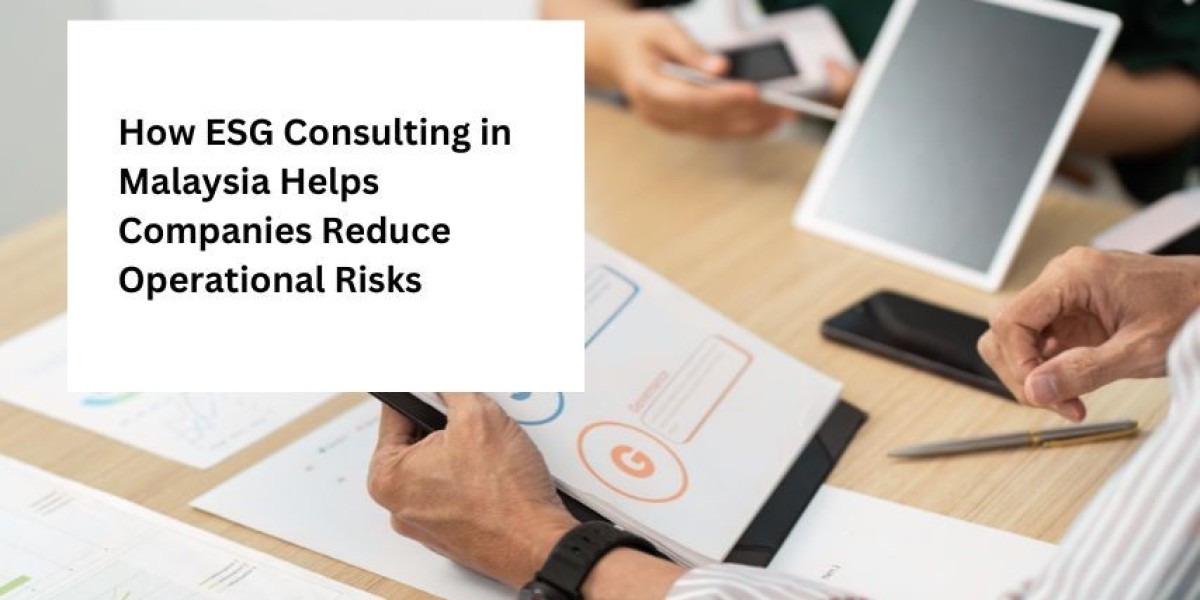The corporate landscape in Malaysia is experiencing a seismic shift. Companies are no longer judged solely on their financial performance. Environmental, social, and governance (ESG) factors now play a crucial role in determining business success and sustainability. This transformation presents both challenges and opportunities for Malaysian enterprises seeking to reduce operational risks while maintaining competitive advantage.
ESG consulting has emerged as a strategic solution, helping companies navigate complex regulatory environments, build stakeholder trust, and create resilient business models. For Malaysian companies operating in an increasingly connected global economy, understanding and implementing ESG principles isn't just about corporate responsibility—it's about survival and growth.
Understanding ESG Principles and Their Corporate Importance
Environmental, social, and governance principles form the backbone of modern sustainable business practices. These three pillars work together to create a framework that guides companies toward responsible operations while minimizing risks.
The environmental component focuses on how companies impact natural resources and ecosystems. This includes carbon emissions, waste management, energy efficiency, and biodiversity preservation. Social factors examine how companies treat employees, customers, suppliers, and communities. Areas like workplace diversity, human rights, labor practices, and community engagement fall under this umbrella.
Governance represents the internal systems and controls that guide company operations. This encompasses board composition, executive compensation, audit practices, shareholder rights, and transparency measures. Together, these elements create a comprehensive approach to business management that considers long-term sustainability over short-term gains.
The growing importance of ESG in the corporate world stems from several converging factors. Investors are increasingly demanding transparency and accountability from companies they fund. Studies show that 83% of global investors consider ESG factors when making investment decisions. This shift means companies with poor ESG practices face higher capital costs and reduced access to funding.
Regulatory pressure is mounting worldwide. Governments are implementing stricter environmental regulations, labor standards, and corporate governance requirements. Companies that fail to adapt face significant legal and financial consequences. Consumer behavior has also evolved dramatically. Modern consumers actively seek brands that align with their values, creating market pressure for responsible business practices.
Risk management has become more sophisticated as companies recognize the interconnected nature of operational risks. ESG factors often serve as early warning indicators for potential operational disruptions. Companies that monitor and manage these factors proactively can avoid costly surprises and maintain operational continuity.
The Malaysian Business Landscape and ESG Relevance
Malaysia's unique economic position makes ESG particularly relevant for companies operating within its borders. As a middle-income country with ambitious development goals, Malaysia faces the challenge of balancing economic growth with environmental protection and social development.
The country's economy relies heavily on natural resource extraction, manufacturing, and services. Palm oil production, mining operations, and manufacturing facilities create significant environmental impacts that require careful management. Malaysia's position as a major palm oil producer has brought international scrutiny regarding deforestation and biodiversity loss. Companies in this sector face increasing pressure from global buyers demanding sustainable sourcing practices.
Malaysia's multicultural society presents both opportunities and challenges for social responsibility initiatives. With diverse ethnic groups, languages, and cultural practices, companies must navigate complex social dynamics while ensuring fair treatment and representation across all communities. Labor practices have come under international attention, particularly regarding migrant worker treatment and supply chain transparency.
The Malaysian government has recognized ESG's importance and implemented various initiatives to promote sustainable business practices. Bursa Malaysia introduced sustainability reporting requirements for listed companies. The Securities Commission Malaysia established guidelines for sustainable and responsible investment. These regulatory developments create compliance requirements that companies must navigate carefully.
Global supply chain integration means Malaysian companies often serve multinational corporations with strict ESG requirements. Failure to meet these standards can result in lost contracts and damaged relationships. Companies that proactively address ESG concerns gain competitive advantages in securing international business partnerships.
Climate change poses significant risks to Malaysian businesses. Rising sea levels threaten coastal operations, while extreme weather events can disrupt supply chains and damage infrastructure. Companies that ignore environmental factors face increasing operational vulnerabilities as climate impacts intensify.
Specific Ways ESG Consulting Reduces Operational Risks
ESG consulting provides Malaysian companies with systematic approaches to identify, assess, and mitigate operational risks across multiple dimensions. Professional consultancy firms like Wellkinetics bring expertise and frameworks that help companies develop comprehensive risk management strategies.
Regulatory Compliance and Legal Risk Mitigation
Malaysia's regulatory environment is becoming increasingly complex, with new environmental, labor, and governance requirements emerging regularly. ESG consultants help companies stay ahead of regulatory changes by monitoring policy developments and ensuring proactive compliance.
Consultants conduct comprehensive compliance audits that identify gaps between current practices and regulatory requirements. They develop implementation roadmaps that prioritize critical compliance areas while managing resource allocation efficiently. This proactive approach prevents costly violations and reduces legal exposure.
Environmental regulations present particular challenges for Malaysian companies. Waste management requirements, emissions standards, and environmental impact assessment obligations require specialized knowledge to navigate effectively. ESG consultants provide technical expertise to ensure compliance while optimizing operational efficiency.
Labor law compliance has become increasingly important as Malaysia faces international scrutiny regarding worker rights and conditions. Consultants help companies develop robust human resources policies that exceed minimum requirements and demonstrate commitment to fair labor practices. This approach reduces reputational risks while improving employee satisfaction and retention.
Stakeholder Trust and Reputational Risk Management
Building and maintaining stakeholder trust has become critical for operational success in Malaysia's interconnected business environment. ESG consultants help companies develop comprehensive stakeholder engagement strategies that address concerns proactively and build long-term relationships.
Investor relations benefit significantly from professional ESG consulting. Consultants help companies develop transparent reporting mechanisms that demonstrate ESG performance to current and potential investors. This transparency reduces information asymmetries and can lower capital costs while improving access to sustainable finance options.
Community engagement strategies developed by ESG consultants help companies build positive relationships with local communities where they operate. These relationships prove valuable during challenging periods and can prevent operational disruptions caused by community opposition.
Customer trust has become increasingly important as Malaysian consumers become more environmentally and socially conscious. ESG consultants help companies develop authentic sustainability narratives that resonate with target audiences while avoiding greenwashing accusations.
Supply chain transparency initiatives supported by consultants help companies identify and address potential reputational risks throughout their value chains. This proactive approach prevents negative publicity and maintains brand integrity in competitive markets.
Supply Chain Resilience and Operational Continuity
Malaysian companies often operate complex supply chains that span multiple countries and industries. ESG consultants help companies assess supply chain vulnerabilities and develop strategies to improve resilience while maintaining cost effectiveness.
Environmental risks in supply chains have become increasingly important as climate change impacts intensify. Consultants help companies identify suppliers located in high-risk areas and develop contingency plans for potential disruptions. They also assist in establishing supplier requirements that promote environmental sustainability throughout the value chain.
Social risks in supply chains, particularly regarding labor practices, require careful management to avoid operational disruptions and reputational damage. ESG consultants help companies develop supplier codes of conduct and monitoring systems that ensure consistent standards across all partners.
Governance risks in supply chains can create significant operational vulnerabilities. Consultants help companies assess supplier financial stability, compliance practices, and risk management capabilities. This assessment enables better supplier selection and relationship management decisions.
Business continuity planning benefits from ESG integration as consultants help companies identify potential disruption sources and develop comprehensive response strategies. This holistic approach to risk management improves overall operational resilience.
Implementation Strategies and Best Practices
Successful ESG consulting engagements in Malaysia typically follow structured approaches that ensure comprehensive coverage while maintaining practical focus on operational improvements.
The assessment phase involves comprehensive reviews of current ESG practices, risk exposures, and improvement opportunities. Consultants use established frameworks and industry benchmarks to evaluate performance across all three ESG dimensions. This objective assessment provides baseline measurements and identifies priority areas for improvement.
Strategy development builds on assessment findings to create customized roadmaps that align with company objectives and resource constraints. Consultants help prioritize initiatives based on risk reduction potential, implementation feasibility, and resource requirements. This strategic approach ensures efficient resource allocation and measurable progress.
Implementation support involves ongoing guidance as companies execute their ESG strategies. Consultants provide technical expertise, change management support, and progress monitoring to ensure successful outcomes. This hands-on approach increases implementation success rates while building internal capabilities.
Monitoring and reporting systems developed during consulting engagements enable companies to track progress and demonstrate performance to stakeholders. These systems provide early warning indicators for emerging risks while supporting continuous improvement efforts.
Future Outlook and Emerging Trends
The ESG consulting landscape in Malaysia continues to evolve as new regulations, technologies, and market demands emerge. Climate risk assessment has become increasingly sophisticated as companies recognize the potential operational impacts of environmental change.
Digital technologies are transforming ESG monitoring and reporting capabilities. Blockchain applications enable supply chain transparency, while artificial intelligence supports risk assessment and prediction. Malaysian companies that embrace these technological advances gain competitive advantages in ESG performance.
Stakeholder expectations continue to rise as awareness of ESG issues increases. Companies must adapt their strategies to meet evolving demands while maintaining operational efficiency. ESG consultants play crucial roles in helping companies navigate these changing expectations.
Conclusion
ESG consulting has become essential for Malaysian companies seeking to reduce operational risks while building sustainable competitive advantages. The combination of regulatory pressure, stakeholder expectations, and operational benefits creates compelling business cases for ESG investment.
Companies that embrace ESG principles through professional consulting support position themselves for long-term success in Malaysia's evolving business environment. The risk reduction benefits alone justify the investment, while the additional advantages of improved stakeholder relationships and operational efficiency create sustainable value creation opportunities.
The time for reactive ESG approaches has passed. Malaysian companies must take proactive steps to assess their ESG performance, identify improvement opportunities, and implement comprehensive strategies that address operational risks while creating stakeholder value.







